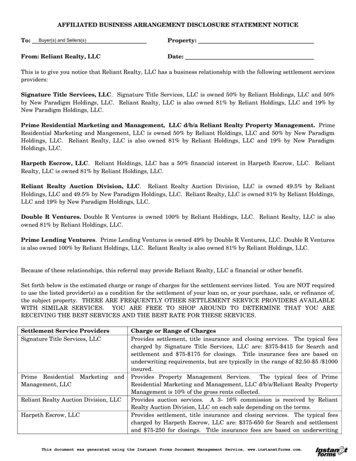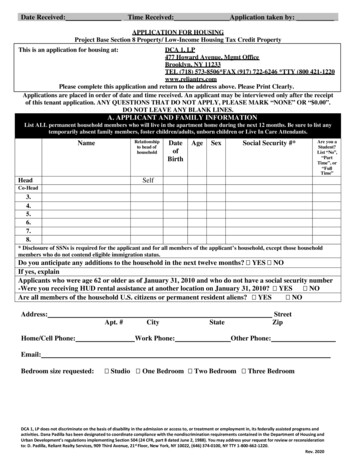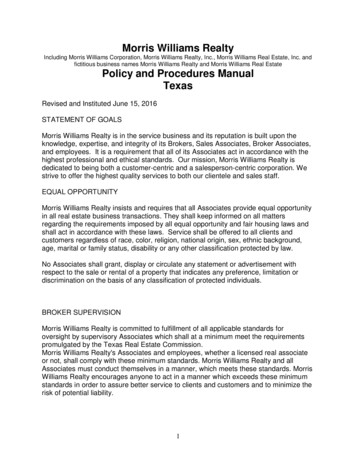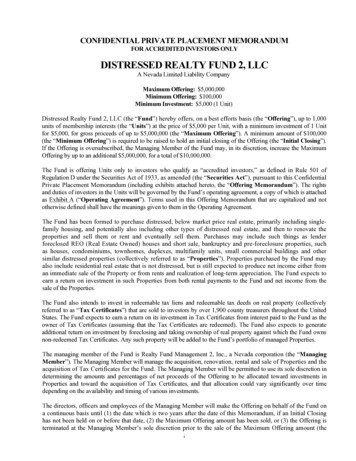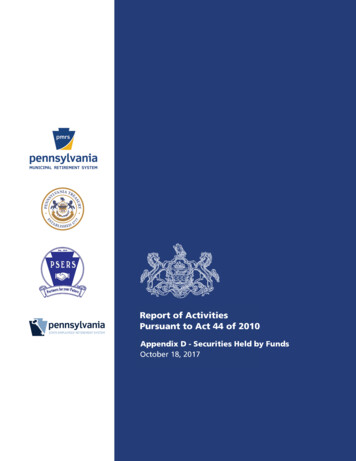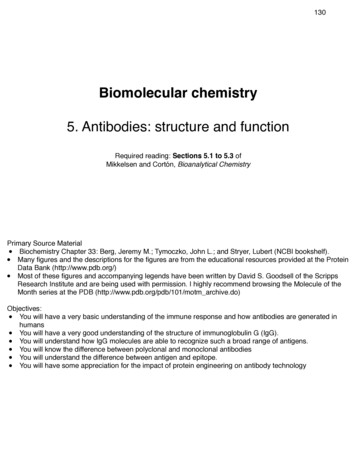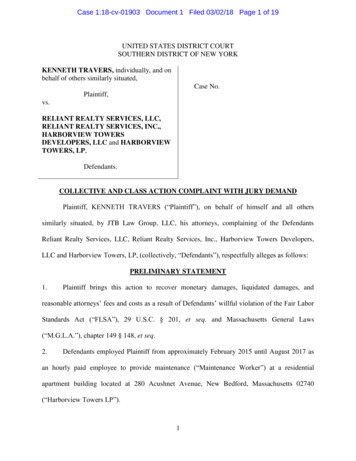
Transcription
Case 1:18-cv-01903 Document 1 Filed 03/02/18 Page 1 of 19UNITED STATES DISTRICT COURTSOUTHERN DISTRICT OF NEW YORKKENNETH TRAVERS, individually, and onbehalf of others similarly situated,Case No.Plaintiff,vs.RELIANT REALTY SERVICES, LLC,RELIANT REALTY SERVICES, INC.,HARBORVIEW TOWERSDEVELOPERS, LLC and HARBORVIEWTOWERS, LP,Defendants.COLLECTIVE AND CLASS ACTION COMPLAINT WITH JURY DEMANDPlaintiff, KENNETH TRAVERS (“Plaintiff”), on behalf of himself and all otherssimilarly situated, by JTB Law Group, LLC, his attorneys, complaining of the DefendantsReliant Realty Services, LLC, Reliant Realty Services, Inc., Harborview Towers Developers,LLC and Harborview Towers, LP, (collectively, “Defendants”), respectfully alleges as follows:PRELIMINARY STATEMENT1.Plaintiff brings this action to recover monetary damages, liquidated damages, andreasonable attorneys’ fees and costs as a result of Defendants’ willful violation of the Fair LaborStandards Act (“FLSA”), 29 U.S.C. § 201, et seq. and Massachusetts General Laws(“M.G.L.A.”), chapter 149 § 148, et seq.2.Defendants employed Plaintiff from approximately February 2015 until August 2017 asan hourly paid employee to provide maintenance (“Maintenance Worker”) at a residentialapartment building located at 280 Acushnet Avenue, New Bedford, Massachusetts 02740(“Harborview Towers LP”).1
Case 1:18-cv-01903 Document 1 Filed 03/02/18 Page 2 of 193.Defendants improperly compensated Maintenance Workers for hours they worked inexcess of forty (40) hours in a workweek in the following ways:a. Not paying Maintenance Workers for all hours they worked each week outside oftheir regular schedule;b. Not paying Maintenance Workers for hours they spent working while on-call;c. Not paying Maintenance Workers for time sport working during unpaid lunchbreaks;d. Not ensuring that Maintenance Workers were completely relieved of duty duringtheir unpaid meal breaks;e. Not including the value of apartments provided by Defendants to MaintenanceWorkers when computing the regular rate used to pay their overtime. See 29C.F.R. § 778.116 (“Where an employer furnishes lodging to his employees inaddition to cash wages the reasonable cost or the fair value of the lodging (perweek) must be added to the cash wages before the regular rate is determined.”).4.Based on Defendants’ foregoing violations of the FLSA, Plaintiff seeks unpaid overtimewages calculated at time-and-a-half of his regular rate of pay for all hours worked in excess offorty (40) in a workweek, as well as liquidated damages, pre-judgment interest, attorneys’ feesand costs.5.In addition to his individual FLSA claims, Plaintiff also brings this collective actionpursuant to 29 U.S.C. § 216(b) on behalf of all Maintenance Workers employed by Defendantsin the applicable time period, and seeks unpaid overtime, liquidated damages, attorneys’ fees andcosts, and any other remedies to which they may be entitled.2
Case 1:18-cv-01903 Document 1 Filed 03/02/18 Page 3 of 196.Plaintiff brings this class action pursuant to Fed. R. Civ. P. Rule 23 on behalf of allMaintenance Workers employed by Defendants in the applicable time period and who worked inMassachusetts, and seeks unpaid overtime, liquidated damages, attorneys’ fees and costs, andany other remedies to which they may be entitled.7.Plaintiff seeks to hold all Defendants jointly and severally liable on the basis that at allrelevant times, all Defendants comprised a single integrated enterprise with common ownershipand management and interrelated operations.JURISDICTION & VENUE8.This Court has subject matter jurisdiction pursuant to 28 U.S.C. §§ 1331 becausePlaintiff’s claims raise a federal question under 29 U.S.C. § 201, et seq.9.As to claims under Massachusetts State law, this Court has supplemental subject matterjurisdiction pursuant to 28 U.S.C. § 1367.10.Defendant RELIANT REALTY SERVICES, LLC is subject to personal jurisdiction inNew York because it is incorporated in New York and maintains its principal place of businessin New York.11.Defendant RELIANT REALTY SERVICES, INC is subject to personal jurisdiction inNew York because it is incorporated in New York and maintains its principal place of businessin New York.12.Defendant HARBORVIEW TOWERS DEVELOPERS, LLC is subject to personaljurisdiction in New York because it is incorporated in New York and maintains its principalplace of business in New York.3
Case 1:18-cv-01903 Document 1 Filed 03/02/18 Page 4 of 1913.Defendant HARBORVIEW TOWERS, LP is subject to personal jurisdiction in NewYork because its general partner HARBORVIEW TOWERS DEVELOPERS, LLC is based inNew York.14.Venue is proper in this District pursuant to 28 U.S.C. § 1391(b) and (c) because asubstantial part of the acts or omissions giving rise to this action occurred in this District andDefendants are residents of this District and subject to personal jurisdiction in this District.THE PARTIES15.At all relevant times, Defendant RELIANT REALTY SERVICES, LLC, (“Reliant LLC”)has been a New York for-profit Limited Liability Company, with its principal place of businessat 885 Second Avenue, 31st Floor, New York, NY 10017.16.Reliant LLC “employs and manages approximately 700 personnel who facilitateoperations at the asset level. [Reliant LLC] currently provides property management, legal,accounting, security, compliance and maintenance services to approximately 13,000 units across10 states.” www.reliantrs.com.17.Defendant RELIANT REALTY SERVICES, INC., (“Reliant Inc.”) was a New York for-profit corporation, with its principal place of business at 885 Second Avenue, 31st Floor, NewYork, NY 10017.18.Reliant Inc. is the predecessor in interests to Reliant LLC.19.Reliant LLC is the successor in interests to Reliant Inc.20.Defendant HARBORVIEW TOWERS DEVELOPERS, LLC has been a New York for-profit Limited Liability Company, with its principal place of business at 885 Second Avenue,31st Floor, New York, NY 10017.4
Case 1:18-cv-01903 Document 1 Filed 03/02/18 Page 5 of 1921.Defendant HARBORVIEW TOWERS, L.P. has been a Massachusetts for-profit LimitedLiability generalpartnerofHARBORVIEW TOWERS, L.P.23.Defendants shared a place of business at 885 Second Avenue, 31st Floor, New York, NY10017.24.Defendants jointly own and/or operate one or more apartment buildings at or around 280Acushnet Avenue, New Bedford, MA 02740 known as Harborview Towers.25.Defendants controlled Plaintiff’s employment and were responsible for hiring, firing,scheduling, controlling, managing, supervising, and record-keeping as to Plaintiff’s employment.26.Defendants employed Plaintiff as a single integrated enterprise.27.Reliant LLC and its predecessor Reliant Inc. own and/or operate apartment buildingsand/or complexes throughout the country.28.Each apartment building and/or complex that Reliant LLC and its predecessor ReliantInc. own and/or operate has a separate legal entity associated with solely that apartment buildingand/or complex.29.For example, Reliant LLC and Reliant Inc., in conjunction with Gates, L.P., own and/oroperate one or more apartment buildings at or around 690 and 700 Gates Avenue, Brooklyn, NY11221.30.Each of these apartment complexes and/or buildings is run as a single integratedenterprise with Reliant LLC and Reliant Inc. jointly and severally liable for the employees atthose locations, including Maintenance Workers.31.At all relevant times, Plaintiff has been a resident of Bristol County, Massachusetts.5
Case 1:18-cv-01903 Document 1 Filed 03/02/18 Page 6 of 1932.Plaintiff has executed his consent to joint form, attached hereto as Exhibit A.FACTUAL ALLEGATIONSDefendants’ Business33.Plaintiff repeats and realleges all preceding paragraphs of the Complaint inclusive, as iffully set forth herein.34.At all relevant times, Defendants were engaged in the business of building ownership andmanagement throughout the United States.35.Defendants employ hundreds of employees at any given time.36.Defendants have common management, ownership, and financial control, includingsharing officers and registered agents.37.Defendants jointly controlled, supervised, trained, hired, fired, and compensatedMaintenance Workers at their buildings, including Plaintiff.38.Defendants were a single entity operating under different corporate forms.39.Defendants owned and managed the Harborview Towers apartment complex wherePlaintiff worked.40.Plaintiff’s pay records identified Harborview Towers LP as his employer.41.Plaintiff’s direct superiors were employees of Reliant LLC and its predecessor ReliantInc.42.In practice, Plaintiff experienced no difference between these companies. They operatedas one single entity.43.At all relevant times, Defendants’ annual gross revenue exceeded 500,000.44.At all relevant times, Defendants had employees engaged in commerce, and handledgoods that had been moved in or produced for commerce.6
Case 1:18-cv-01903 Document 1 Filed 03/02/18 Page 7 of 1945.Defendants are aware that the FLSA applies to their businesses and that they are requiredto adhere to the FLSA.46.Defendants’ conduct and practices, described herein, were and are willful, intentional,unreasonable, arbitrary, and in bad faith.Plaintiff’s Employment47.Defendants employed Plaintiff from approximately February 2015 until August 2017 as aMaintenance Worker.48.Plaintiff performed maintenance in Defendants’ Harborview Towers apartment complex.49.Defendants paid Plaintiff based on an hourly rate for the time he spent working during hisregular schedule.50.Defendants paid Plaintiff for some hours in excess of forty (40) in a workweek at a rateequal to one and a half times his hourly rate.51.Defendants also paid Plaintiff by providing him with lodging valued at approximately 1,006 per month or 231.26 per week (weekly value derived by dividing monthly value by 4.35weeks per month).52.Defendants did not include the value of the lodging when computing Plaintiff’s regularrate for purposes of computing overtime. See 29 C.F.R. § 778.116 (“Where an employerfurnishes lodging to his employees in addition to cash wages the reasonable cost or the fair valueof the lodging (per week) must be added to the cash wages before the regular rate isdetermined.”).53.Plaintiff’s regular schedule consisted of working eight hours a day from Monday throughFriday.54.He was scheduled to begin his shifts at 8:00 A.M.7
Case 1:18-cv-01903 Document 1 Filed 03/02/18 Page 8 of 1955.During some periods of his employment, his scheduled shifts ended at 4:30 P.M. Theseshifts included a half hour unpaid lunch break.56.During some periods of his employment, his scheduled shifts ended at 5:00 P.M. Theseshifts included an hour long unpaid lunch break.57.Defendants frequently required Plaintiff to work during at least part of his lunch breakwithout compensation.58.Plaintiff was often not completely relieved from duty during his meal breaks.59.Defendants also required Plaintiff to perform work outside of his regular schedule.60.Defendants occasionally required Plaintiff to work before a shift began, after a shiftended, or on weekends.61.This work could include regular maintenance work or on occasion larger maintenanceprojects. For example, Plaintiff may have had to work on a Saturday to clean-up after a storm.62.In addition to the work described above, Defendants also required Plaintiff to be on-callto respond to immediate emergencies.63.Examples of emergencies could include a resident being locked-out, flooding caused by aplumbing issue, and etcetera.64.Defendants did not pay Plaintiff for all of the time he spent working outside of his regularhours, even when he recorded working those hours in Defendants’ time tracking system.65.Defendants utilized an electronic time punch to track Plaintiff’s time.66.Defendants often failed to pay Plaintiff for all of the hours he recorded into theirelectronic time punch.8
Case 1:18-cv-01903 Document 1 Filed 03/02/18 Page 9 of 1967.When Plaintiff first began working, Plaintiff used the electronic time punch to recordmost of the hours he spent working except time spent responding to on-call emergencyassignments.68.Defendants did not require Plaintiff to clock-in for this time nor did they intend to payPlaintiff for time spent working while on-call.69.Defendants viewed Plaintiff’s on-call responsibilities and any work while on-call asbeing an unpaid part of his live-in Maintenance Worker responsibilities.70.Towards the end of his employment, Defendants began requiring Plaintiff to record thehours he spent working while on-call.71.Even though he began recording those hours, he was still not paid for all of those hours.72.For example, for the pay period of April 17, 2017 to April 30, 2017, Defendants paidPlaintiff for eighty (80) regular hours at 18.8173/hour and 3.07 overtime hours at 28.2260.73.Plaintiff worked more than 3.07 hours in excess of forty in a workweek during the payperiod of April 17, 2017 to April 30, 2017, including, but not limited to, time worked off theclock while on call for which he did not receive compensation.74.Defendants did not include the value of the apartment they provided to Plaintiff incomputing his overtime rate during the pay period of April 17, 2017 to April 30, 2017.75.As a result of the foregoing, Plaintiff was regularly not paid wages earned by him withinthe time frame required by M.G.L.A. chapter 149 § 148.Common Policy for Maintenance Workers76.Maintenance Workers performed maintenance in Defendants’ apartment complexes.77.Defendants paid Maintenance Workers based on an hourly rate for the time they spentworking during their regular schedule.9
Case 1:18-cv-01903 Document 1 Filed 03/02/18 Page 10 of 1978.Defendants paid Maintenance Workers for some hours in excess of forty (40) in aworkweek at a rate equal to one and a half times their hourly rate.79.Defendants also paid some Maintenance Workers by providing them with lodging.80.Defendants did not include the value of the lodging when computing MaintenanceWorkers’ regular rate for purposes of computing overtime.See 29 C.F.R. § 778.116(“Where an employer furnishes lodging to his employees in addition to cash wages thereasonable cost or the fair value of the lodging (per week) must be added to the cash wagesbefore the regular rate is determined.”).81.Maintenance Workers regular schedule often consisted of working eight hours a day fromMonday through Friday.82.Defendants frequently required Maintenance Workers to work during at least part of theirlunch breaks without compensation.83.Maintenance Workers were often not completely relieved from duty during their mealbreaks.84.Defendants also required Maintenance Workers to perform work outside of their regularschedule.85.Defendants occasionally required Maintenance Workers to work before a shift began,after a shift ended, or on weekends.86.This work could include regular maintenance work or on occasion larger maintenanceprojects. For example, Maintenance Workers may have had to work on a Saturday to clean-upafter a storm.87.In addition to the work described above, Defendants also required at least someMaintenance Workers to be on-call to respond to immediate emergencies.10
Case 1:18-cv-01903 Document 1 Filed 03/02/18 Page 11 of 1988.Examples of emergencies could include a resident being locked-out, flooding caused by aplumbing issue, and etcetera.89.Defendants did not pay Maintenance Workers for all of the time they spent workingoutside of their regular hours, even when they recorded working those hours in Defendants’ timetracking system.90.At least some of the work Maintenance Workers performed outside of their regularschedule consisted of responding to emergency calls that they received while on-call.91.Defendants did not pay Maintenance Workers for all of the time they spent workingoutside of their regular hours, even when they recorded working those hours in Defendants’ timetracking system.92.As a result of the foregoing, Maintenance Workers employed in Massachusetts wereregularly not paid wages earned by them within the time frame required by M.G.L.A. chapter149 § 148.COLLECTIVE AND CLASS ACTION ALLEGATIONS93.Plaintiff repeats and realleges all preceding paragraphs of the Complaint inclusive, as iffully set forth herein.94.Plaintiff brings this action pursuant to 29 U.S.C. § 216(b) of the FLSA on his own behalfand on behalf of:All Maintenance Workers who worked for Defendants at any time withinthe period of three years prior to the commencement of this action and thedate of judgment(hereinafter referred to as the “FLSA Collective”). Plaintiff reserves the right to amend thisdefinition as necessary.11
Case 1:18-cv-01903 Document 1 Filed 03/02/18 Page 12 of 1995.Plaintiff brings this action pursuant to Fed. R. Civ. P. Rule 23 as to claims underM.G.L.A. on his own behalf and on behalf of:All Maintenance Workers who worked for Defendants in Massachusetts atany time within the period of three years prior to the commencement ofthis action and the date of judgment(hereinafter referred to as the “Rule 23 Class”). Plaintiff reserves the right to amend thisdefinition as necessary.96.With respect to the claims set forth herein, a collective action under the FLSA and a classaction under Fed. R. Civ. P. Rule 23 is appropriate because the employees described above are“similarly situated” to Plaintiff in this matter. Plaintiff brings this collective and class action onbehalf of the members of the FLSA Collective and the Rule 23 Class because: (a) they have beenor are performing the same or similar job duties as one another on behalf of Defendants; (b) theywere or are subject to the same or similar unlawful practices, policies, or plans; and (c) theirclaims are based upon the same factual and legal theories.97.Defendants subjected the FLSA Collective and Rule 23 Class members to the followingpolicies and/or practices:a. Failure to include the cost of lodging provided to FLSA Collective and Rule 23Class members when calculating their regular rate;b. Failure to pay FLSA Collective and Rule 23 Class members for time sportworking during unpaid lunch breaks;c. Failure to ensure that FLSA Collective and Rule 23 Class members werecompletely relieved of duty during unpaid meal breaks;d. Failure to pay FLSA Collective and Rule 23 Class members for time spentworking while on call;12
Case 1:18-cv-01903 Document 1 Filed 03/02/18 Page 13 of 19e. Failure to pay FLSA Collective and Rule 23 Class members for all the hours theyspent working.98.Defendants’ failure to compensate Plaintiff properly results from a policy or practiceapplicable to all members of the FLSA Collective and Rule 23 Class who work(ed) in similarpositions.99.Plaintiff estimates that the FLSA Collective and Rule 23 Class includes hundreds ofmembers across several states. The precise number of FLSA Collective and Rule 23 Classmembers should be readily available from a review of Defendants’ personnel and payrollrecords.100.The class is so numerous that joinder of all members is impractical. While the exactnumber and identities of Class members are unknown at this time, and can only be ascertainedthrough appropriate discovery, Plaintiff believes that at least 50 putative class members haveworked for Defendants during the applicable statutory period, without receiving the appropriatepay, as required by law.101.This litigation is properly brought as a class action because of the existence of questionsof fact and law common the Rule 23 Class which predominate over any questions affecting onlyindividual members, including:a. Whether Defendants are liable to Rule 23 Class members for violations of theM.G.L.A.;b. Whether Rule 23 Class members were paid all the wages they had earned.102.This litigation is properly brought as a class action because Plaintiff’s claims are typicalof the claims of the members of the Rule 23 Class, inasmuch as all such claims arise from13
Case 1:18-cv-01903 Document 1 Filed 03/02/18 Page 14 of 19Defendants’ standard policies and practices, as alleged herein. Like all Class members, Plaintiffwas damaged by Defendants’ policies and practices which failed to pay all wages earned.103.Plaintiff has no interests antagonistic to the interests of the other members of the Class.Plaintiff is committed to the vigorous prosecution of this action and has retained competentcounsel experienced in class action litigation.Accordingly, Plaintiff is an adequaterepresentative and will fairly and adequately protect the interests of the Class.104.A class action is an appropriate and superior method for the fair and efficient adjudicationof the present controversy given the following factors:a. Common questions of law and/or fact predominate over any individual questionswhich may arise, and, accordingly, there would accrue enormous savings to both theCourt and the Class in litigating the common issues on a classwide instead of on arepetitive individual basis;b. Despite the relatively small size of individual Class members’ claims, theiraggregate volume, coupled with the economies of scale inherent in litigating similarclaims on a common basis, will enable this case to be litigated as a Class action on acost-effective basis, especially when compared with repetitive individual litigation;andc. No unusual difficulties are likely to be encountered in the management of thisclass action in that all questions of law and/or fact to be litigated at the liability stageof this action are common to the Class.105.Class certification is also fair and efficient because prosecution of separate actions byindividual Class members would create a risk of differing adjudications with respect to suchindividual members of the Class, which as a practical matter may be dispositive of the interests14
Case 1:18-cv-01903 Document 1 Filed 03/02/18 Page 15 of 19of other members not parties to the adjudication, or substantially impair or impede their ability toprotect their interests.106.Plaintiff anticipates that there will be no difficulty in the management of this litigation.This litigation presents FLSA claims of a type that have often been prosecuted on a classwidebasis, and the manner of identifying the Class and providing any monetary relief to it can easilybe effectuated from a review of Defendants’ records.107.Defendants are aware that the FLSA applies to their businesses and that they are requiredto adhere to the FLSA.108.Defendants’ conduct and practices, described herein, were and are willful, intentional,unreasonable, arbitrary, and in bad faith.COUNT I: INDIVIDUAL CLAIMViolation of the Fair Labor Standards Act, 29 U.S.C. § 201, et seq.109.Plaintiff repeats and realleges all preceding paragraphs of the Complaint inclusive, as iffully set forth herein.110.Plaintiff regularly worked in excess of forty (40) hours per workweek.111.Defendants failed to compensate Plaintiff for all of his hours in excess of forty (40) hoursin a workweek at a rate of not less than one and one half (1.5) times of his regular rate of pay.112.Defendants also failed to incorporate the cost of the lodging they provided to Plaintiffinto his regular rate as required by 29 C.F.R. § 778.116.113.Defendants’ conduct and practices, described herein, were willful, intentional,unreasonable, arbitrary, and in bad faith.114.As a result of the foregoing, Plaintiff was illegally denied proper compensation, in suchamounts to be determined at trial, and is entitled to recovery of total unpaid amounts, liquidated15
Case 1:18-cv-01903 Document 1 Filed 03/02/18 Page 16 of 19damages, reasonable attorneys’ fees and costs, and other compensation pursuant to 29 U.S.C. §216(b).COUNT II: 29 U.S.C. § 216(b) COLLECTIVE ACTION CLAIMViolation of the Fair Labor Standards Act, 29 U.S.C. § 201, et seq.115.Plaintiff repeats and realleges all preceding paragraphs of the Complaint inclusive, as iffully set forth herein.116.FLSA Collective Members regularly worked in excess of forty (40) hours per workweek.117.Defendants failed to compensate FLSA Collective Members for all of their hours inexcess of forty (40) hours in a workweek at a rate of not less than one and one half (1.5) times ofhis regular rate of pay.118.Defendants also failed to incorporate the cost of any lodging they provided to FLSACollective Members into their regular rate as required by 29 C.F.R. § 778.116.119.Defendants’ conduct and practices, described herein, were willful, intentional,unreasonable, arbitrary, and in bad faith.120.As a result of the foregoing, FLSA Collective Members were illegally denied propercompensation, in such amounts to be determined at trial, and is entitled to recovery of totalunpaid amounts, liquidated damages, reasonable attorneys’ fees and costs, and othercompensation pursuant to 29 U.S.C. § 216(b).COUNT III: INDIVIDUAL CLAIMViolation of the M.G.L.A. chapter 149 § 148, 150121.Plaintiff repeats and realleges all the preceding paragraphs of this Complaint, as if fullyset forth herein.122.Defendants did not pay Plaintiff weekly or bi-weekly all of the wages earned by him.16
Case 1:18-cv-01903 Document 1 Filed 03/02/18 Page 17 of 19123.Defendants’ failure to pay Plaintiff all of the wages earned by him violates the M.G.L.A.,chapter 149 § 148, 150.124.Defendants’ conduct and practices, as described above, were willful, intentional,unreasonable, arbitrary, and in bad faith.125.As a result of the foregoing, Plaintiff was illegally deprived of compensation earned, insuch amounts to be determined at trial, and is entitled to recovery of total unpaid amounts,liquidated damages, pre-judgment interest, costs, reasonable attorneys’ fees and othercompensation pursuant to M.G.L.A.COUNT IV: RULE 23 CLASS CLAIMViolation of the M.G.L.A. chapter 149 § 148, 150126.Plaintiff repeats and realleges all the preceding paragraphs of this Complaint, as if fullyset forth herein.127.Defendants did not pay Rule 23 Class members weekly or bi-weekly all of the wagesearned by them.128.Defendants’ failure to pay Rule 23 Class members all of the wages earned by themviolates the M.G.L.A., chapter 149 § 148, 150.129.Defendants’ conduct and practices, as described above, were willful, intentional,unreasonable, arbitrary, and in bad faith.130.As a result of the foregoing, Rule 23 Class members were illegally deprived ofcompensation earned, in such amounts to be determined at trial, and is entitled to recovery oftotal unpaid amounts, liquidated damages, pre-judgment interest, costs, reasonable attorneys’fees and other compensation pursuant to M.G.L.A.17
Case 1:18-cv-01903 Document 1 Filed 03/02/18 Page 18 of 19RELIEF REQUESTEDWHEREFORE, Plaintiff, Kenneth Travers, individually and on behalf of all other FLSACollective Members, respectfully requests that this Court grant the following relief:a.Certify this case as a collective action in accordance with 29 U.S.C. § 216(b) withrespect to the FLSA claims set forth herein (Count II);b.Certify this case as a class action in accordance with Fed. R. Civ. P. Rule 23 withrespect to the M.G.L.A. claims set forth herein (Count IV);c.Order Defendants to disclose in computer format, or in print, if no computerreadable format is available, the names and addresses of all FLSA Collective and Rule 23Class Members and permitting Plaintiff to send notice of this action to all FLSACollective and Rule 23 Class Members, including the publishing of notice in a mannerthat is reasonably calculated to apprise the collective members of their rights by law tojoin and participate in this lawsuit;d.Designate Plaintiff as the representative of the FLSA Collective and the Rule 23Class and the undersigned counsel as counsel for the same;e.Direct Defendants, at their expense, to investigate and account for the number ofhours worked by Plaintiff and all FLSA Collective and Rule 23 Class Members who optin to this action;f.Judgment in favor of Plaintiff and against Defendants and awarding Plaintiff andthe FLSA Collective Members the full amount of damages and liquidated damagesavailable by law;18
Case 1:18-cv-01903 Document 1 Filed 03/02/18 Page 19 of 19g.Judgment in favor of Plaintiff and against Defendants and awarding Plaintiff andthe Rule 23 Class Members the full amount of damages and liquidated damages availableby law;h.A declaratory judgment that Defendants’ pay practices alleged herein violate theFLSA, 29 U.S.C. §§ 201, et seq. and M.G.L.A., chapter 149 § 148, et seq.;g.An incentive award for Plaintiff for serving as representative of the FLSACollective pursuant to the FLSA;h. Reasonable attorneys’ fees and costs incurred by Plaintiff in this action as provided bystatute; andi. Awarding such other and further relief as this Court deems appropriate.JURY DEMANDPlaintiff, Kenneth Travers, individually and on behalf of all other FLSA Collective andRule 23 Class Members, by and through his attorneys, hereby demands a trial by jury pursuant toRule 38 of the Federal Rules of Civil Procedure and the court rules and statutes made andprovided with respect to the above entitled claims.RESPECTFULLY SUBMITTED,Dated: March 2, 2018By: /s/Jason T. BrownJason T. BrownJTB LAW GROUP, LLC155 2nd St., Suite 4Jersey City, NJ 07302T: (877) 561-0000F: (855) 582-5297jtb@jtblawgroup.comCounsel for Plaintiff19
Case 1:18-cv-01903 Document 1-1 Filed 03/02/18 Page 1 of 2EXHIBITA
Case 1:18-cv-01903 Document 1-1 Filed 03/02/18 Page 2 of 2UNITED STATES DISTRICT COURTSouthern District of New ----------------------------------------Kenneth Travers, Individually and on Behalf ofAll Others SimilarlySituated,Plaintiffs,Case No.v.Reliant ---CONSENT TO SUEI hereby consent to be a Plaintiff in the Fair Labor Standards Act case captioned above. Ihereby
[Reliant LLC] currently provides property management, legal, accounting, security, compliance and maintenance services to approximately 13,000 units across 10 states." www.reliantrs.com. 17. Defendant RELIANT REALTY SERVICES, INC., ("Reliant Inc.") was a New York for- . Reliant Realty, Travers v. Reliant Realty Services, Llc et al - 1 .
